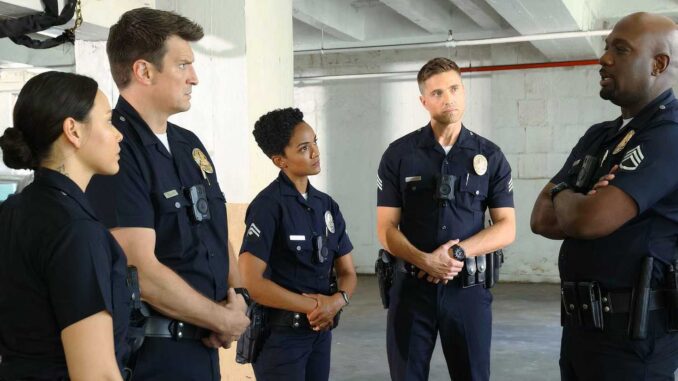
The television landscape, much like a bustling city, often sees its inhabitants cross paths. Detectives from one precinct might lend a hand to another, or lawyers from rival firms might find themselves on the same side of a class-action suit. For shows housed under the same network umbrella, the dream of a crossover event often sparks enthusiastic whispers among fans. Both Will Trent and The Rookie enjoy popular runs on ABC, depicting the lives of law enforcement in their respective, vastly different, cities. Yet, to imagine a team-up between the brilliant, deeply scarred FBI agent Will Trent and the earnest, perpetually learning LAPD officer John Nolan is to envision a narrative collision so fundamentally mismatched, it stretches the very fabric of television plausibility. These two shows, while sharing a network, inhabit separate narrative universes, built on opposing tones, character philosophies, and inherent dramatic stakes that make a joint operation less an improbable flight of fancy and more a fundamental clash of creative DNA.
The most glaring chasm separating Will Trent and The Rookie is their tonal landscape. Will Trent often plunges into the psychological abyss, a world where every clue feels stained with the residue of human suffering and trauma is a ghost lurking in every shadow. The cases are complex, often gruesome, and deeply personal, forcing Will to confront his own profound abandonment issues and a past steeped in abuse. The show’s humor, when it appears, is often dark, wry, and a coping mechanism for characters navigating an unrelenting grimness. The pacing is deliberate, building suspense through character introspection and the slow unveiling of disturbing truths. A joint task force with The Rookie would feel less like a collaboration and more like a forced merger between a gothic novel and a buddy-cop action-comedy.
The Rookie, by contrast, operates under a brighter, if still dramatic, sky. Its Los Angeles is a dynamic, sprawling metropolis where police work ranges from the mundane to the life-threatening, but almost always with an underlying current of optimism and growth. The show embraces a procedural-comedy-drama hybrid, balancing genuine peril and emotional beats with a generous helping of banter, character-driven humor, and a fundamentally hopeful outlook. John Nolan, despite his mid-life career change, embodies this spirit: an everyman trying to do good, learn from his mistakes, and find his place. Imagine the somber intensity of Will Trent, dissecting a crime scene with a therapist’s eye for psychological nuance, suddenly faced with Lucy Chen’s witty remarks about a suspect's questionable fashion choices, or Nolan’s earnest attempts to defuse a situation with a community outreach initiative. The tonal whiplash would be jarring, pulling Will Trent out of its carefully constructed realism and injecting a layer of levity that would feel fundamentally unearned and out of place.
Beyond tone, the core dramatic engines of each show are powered by different fuels. Will Trent’s brilliance stems from his unique ability to see patterns where others don't, often because his own fractured past gives him an unsettling empathy for victims and perpetrators alike. His internal world is a battlefield, and the cases he solves are often intrinsically linked to his journey of healing and self-discovery. The stakes in Will Trent are not just about catching a killer, but about understanding the brokenness of humanity and the ripple effects of trauma. For him, every case is, in some way, personal.
John Nolan, conversely, represents a more traditional heroic arc, albeit with a unique entry point. His struggles are those of experience, ageism, and the daily grind of patrol work. His learning curve, his relationships with his fellow officers, and his desire to make a tangible difference in his community drive his narrative. While The Rookie certainly tackles serious crimes and explores the challenges of policing, its overarching theme is one of progress, teamwork, and the inherent goodness of its protagonists. To pair him with Trent would be to ask Nolan to step into a psychological deep end he's not equipped for, or conversely, to dilute Trent's profound character study into a more conventional "case of the week" dynamic that simplifies his complex internal struggles.
The supporting casts further illustrate this divide. Will Trent's ensemble – Faith Mitchell, Angie Polaski, Michael Ormewood – are all, in their own ways, as scarred and complex as Will, their relationships fraught with history and unspoken pain. Their interactions are often terse, layered with subtext, and propelled by deep emotional currents. The Rookie's ensemble, from Angela Lopez's fierce competence to Tim Bradford's gruff mentorship and Wesley Evers's moral compass, operates with a more outward-facing camaraderie. Their humor is often a shared language, their support more overtly expressed. A meeting between these two worlds would be less a merging of forces and more a linguistic barrier, where the unspoken tensions of Atlanta clash with the open communication of Los Angeles.
Ultimately, the unlikeliness of a Will Trent and The Rookie team-up is not a condemnation of either show, but rather a testament to their individual strengths and distinct identities. Each has carved out a unique space within the procedural genre by committing fully to its chosen tone, character philosophy, and narrative style. To force a crossover would be to ask one, or both, to compromise the very elements that make them compelling television. The gritty shadows of Atlanta and the sun-drenched streets of Los Angeles, though both within the same network city, are separated by an unfathomable chasm of narrative intent. And perhaps, it’s best that they remain there, allowing each to tell its own powerful story in its own inimitable way.